国家税务总局关于印发中国和老挝两国政府避免双重征税协定文本并
- 格式:pdf
- 大小:175.51 KB
- 文档页数:13
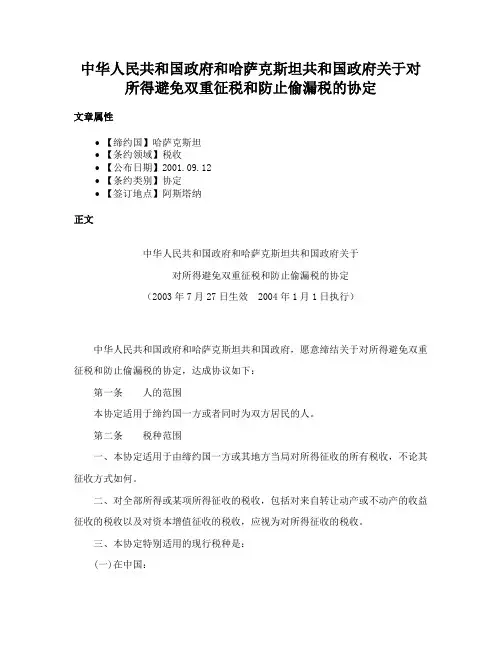
中华人民共和国政府和哈萨克斯坦共和国政府关于对所得避免双重征税和防止偷漏税的协定文章属性•【缔约国】哈萨克斯坦•【条约领域】税收•【公布日期】2001.09.12•【条约类别】协定•【签订地点】阿斯塔纳正文中华人民共和国政府和哈萨克斯坦共和国政府关于对所得避免双重征税和防止偷漏税的协定(2003年7月27日生效2004年1月1日执行)中华人民共和国政府和哈萨克斯坦共和国政府,愿意缔结关于对所得避免双重征税和防止偷漏税的协定,达成协议如下:第一条人的范围本协定适用于缔约国一方或者同时为双方居民的人。
第二条税种范围一、本协定适用于由缔约国一方或其地方当局对所得征收的所有税收,不论其征收方式如何。
二、对全部所得或某项所得征收的税收,包括对来自转让动产或不动产的收益征收的税收以及对资本增值征收的税收,应视为对所得征收的税收。
三、本协定特别适用的现行税种是:(一)在中国:1.个人所得税;2.外商投资企业和外国企业所得税。
(以下简称“中国税收”)(二)在哈萨克斯坦:1.法人所得税;2.个人所得税。
(以下简称“哈萨克斯坦税收”)四、本协定也适用于本协定签订之日后征收的属于增加或者代替现行税种的相同或者实质相似的税收。
缔约国双方主管当局应将各自税法所做出的实质性变动,在其变动后的适当时间内通知对方。
第三条一般定义一、在本协定中,除上下文另有解释的以外:(一)“中国”一语是指中华人民共和国。
用于地理概念时,是指实施有关中国税收法律的所有中华人民共和国领土,包括领海,以及根据国际法,中华人民共和国拥有勘探和开发海底和底土资源以及海底以上水域资源的主权权利的领海以外的区域;(二)“哈萨克斯坦”一语是指哈萨克斯坦共和国。
用于地理概念时,哈萨克斯坦包括哈萨克斯坦共和国的国家领土,以及根据其法律和国际协定,哈萨克斯坦可行使主权权利和管辖权并且适用其税收法律的区域;(三)“缔约国一方”和“缔约国另一方”的用语,按照上下文,是指中国或者哈萨克斯坦;(四)“税收”一语按照上下文,是指中国税收或者哈萨克斯坦税收;(五)“人”一语包括个人、公司和其他团体;(六)“公司”一语是指法人团体或者在税收上视同法人团体的实体;(七)“缔约国一方企业”和“缔约国另一方企业”,分别指缔约国一方居民经营的企业和缔约国另一方居民经营的企业;(八)“国民”一语是指:1.任何具有缔约国一方国籍的个人;2.任何按照缔约国一方现行法律建立的法人、合伙企业或团体;(九)“国际运输”一语是指缔约国一方企业以船舶、飞机或公路车辆经营的运输,不包括仅在缔约国另一方各地之间以船舶、飞机或公路车辆经营的运输;(十)“主管当局”一语在中国方面是指国家税务总局或其授权的代表;在哈萨克斯坦方面是指财政部或其授权的代表;二、缔约国一方在实施本协定时,对于未经本协定明确定义的用语,除上下文另有解释的以外,应当具有该缔约国适用于本协定的税种的法律所规定的含义。
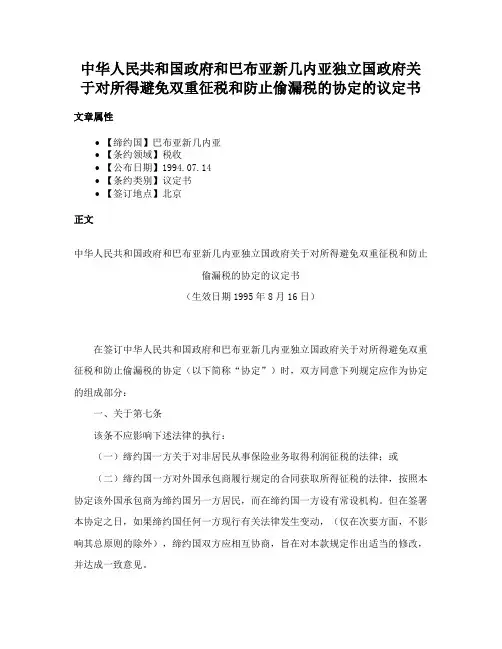
中华人民共和国政府和巴布亚新几内亚独立国政府关于对所得避免双重征税和防止偷漏税的协定的议定书
文章属性
•【缔约国】巴布亚新几内亚
•【条约领域】税收
•【公布日期】1994.07.14
•【条约类别】议定书
•【签订地点】北京
正文
中华人民共和国政府和巴布亚新几内亚独立国政府关于对所得避免双重征税和防止
偷漏税的协定的议定书
(生效日期1995年8月16日)
在签订中华人民共和国政府和巴布亚新几内亚独立国政府关于对所得避免双重征税和防止偷漏税的协定(以下简称“协定”)时,双方同意下列规定应作为协定的组成部分:
一、关于第七条
该条不应影响下述法律的执行:
(一)缔约国一方关于对非居民从事保险业务取得利润征税的法律;或
(二)缔约国一方对外国承包商履行规定的合同获取所得征税的法律,按照本协定该外国承包商为缔约国另一方居民,而在缔约国一方设有常设机构。
但在签署本协定之日,如果缔约国任何一方现行有关法律发生变动,(仅在次要方面,不影响其总原则的除外),缔约国双方应相互协商,旨在对本款规定作出适当的修改,并达成一致意见。
二、关于第十条第二款
第十条第二款所指的税收,在本协定签字之日中国现行法律持续适用的情况下,在巴布亚新几内亚按股息总额的10%征收。
否则,将按第十条第二款的规定征收。
下列代表,经各自政府正式授权,已在本议定书上签字,以昭信守。
本议定书于1994年7月14日在北京签订,一式两份,每份都用中文和英文写成,两种文本具有同等效力。
中国人民共和国政府巴布亚新几内亚独立国政府
代表代表
刘仲藜朱利叶斯·陈。
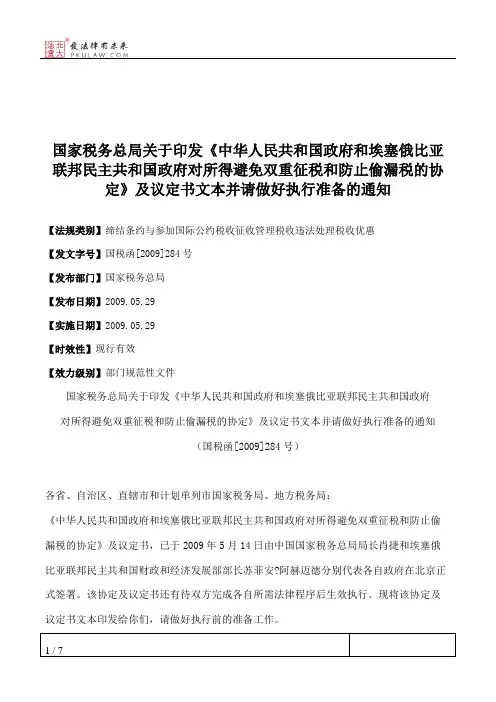
国家税务总局关于印发《中华人民共和国政府和埃塞俄比亚联邦民主共和国政府对所得避免双重征税和防止偷漏税的协定》及议定书文本并请做好执行准备的通知【法规类别】缔结条约与参加国际公约税收征收管理税收违法处理税收优惠【发文字号】国税函[2009]284号【发布部门】国家税务总局【发布日期】2009.05.29【实施日期】2009.05.29【时效性】现行有效【效力级别】部门规范性文件国家税务总局关于印发《中华人民共和国政府和埃塞俄比亚联邦民主共和国政府对所得避免双重征税和防止偷漏税的协定》及议定书文本并请做好执行准备的通知(国税函[2009]284号)各省、自治区、直辖市和计划单列市国家税务局、地方税务局:《中华人民共和国政府和埃塞俄比亚联邦民主共和国政府对所得避免双重征税和防止偷漏税的协定》及议定书,已于2009年5月14日由中国国家税务总局局长肖捷和埃塞俄比亚联邦民主共和国财政和经济发展部部长苏菲安?阿赫迈德分别代表各自政府在北京正式签署。
该协定及议定书还有待双方完成各自所需法律程序后生效执行。
现将该协定及议定书文本印发给你们,请做好执行前的准备工作。
附件:中华人民共和国政府和埃塞俄比亚联邦民主共和国政府对所得避免双重征税和防止偷漏税的协定国家税务总局二○○九年五月二十九日中华人民共和国政府和埃塞俄比亚联邦民主共和国政府对所得避免双重征税和防止偷漏税的协定中华人民共和国政府和埃塞俄比亚联邦民主共和国政府,愿意缔结对所得避免双重征税和防止偷漏税的协定(以下简称“协定”),达成协议如下:第一条人的范围本协定适用于缔约国一方或者同时为双方居民的人。
第二条税种范围一、本协定适用于由缔约国一方或其地方当局对所得征收的税收,不论其征收方式如何。
二、对全部所得或某项所得征收的税收,包括对来自转让动产或不动产的收益征收的税收,应视为对所得征收的税收。
三、本协定特别适用的现行税种是:(一)在中国:1.个人所得税;2.企业所得税;(以下简称“中国税收”);(二)在埃塞俄比亚:1.按第286/2002号公告规定对所得和利润征收的税收;2.按相应公告对采矿、石油和农业活动所得征收的税收;(以下简称“埃塞俄比亚税收”)。
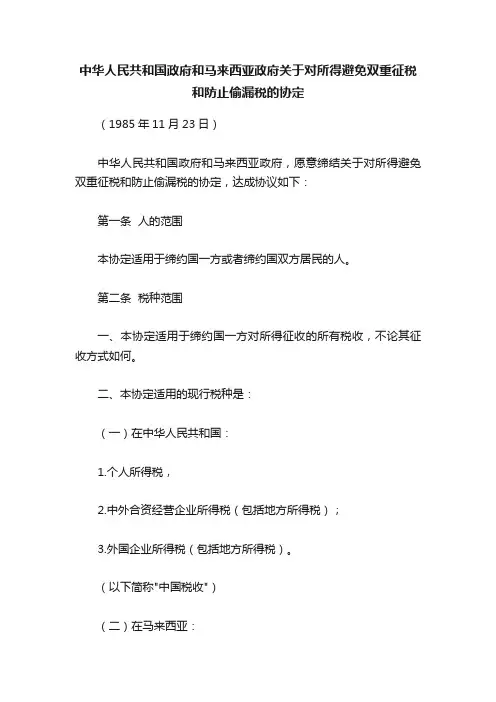
中华人民共和国政府和马来西亚政府关于对所得避免双重征税和防止偷漏税的协定(1985年11月23日)中华人民共和国政府和马来西亚政府,愿意缔结关于对所得避免双重征税和防止偷漏税的协定,达成协议如下:第一条人的范围本协定适用于缔约国一方或者缔约国双方居民的人。
第二条税种范围一、本协定适用于缔约国一方对所得征收的所有税收,不论其征收方式如何。
二、本协定适用的现行税种是:(一)在中华人民共和国:1.个人所得税,2.中外合资经营企业所得税(包括地方所得税);3.外国企业所得税(包括地方所得税)。
(以下简称"中国税收")(二)在马来西亚:1.所得税和超额利润税;2.补充所得税,即锡利润税、开发税和木材利润税;3.石油所得税。
(以下简称"马来西亚税收")四、本协定也适用于本协定签订之日后增加或者代替第二款所列现行税种的相同或者实质相似的税收。
缔约国双方主管当局应将各自税法所作的实质变动,在其变动后的适当时间内通知对方。
第三条一般定义一、在本协定中,除上下文另有解释的以外:(一)"中国"一语是指中华人民共和国;用于地理概念时,是指实施有关中国税收法律的所有中华人民共和国领土,包括领海,以及根据国际法,中华人民共和国拥有勘探和开发海底和底土资源以及海底以上水域资源的主权权利的领海以外的区域;(二)"马来西亚"一语是指马亚西亚联邦,并包括根据与国际法一致的马亚西亚法律,马来西亚拥有和行使旨在于勘探和开发海底和底土以及海底以上水域的生物或非生物资源的主权权利的马来西亚领海及其以外的区域;(三)"缔约国一方"和"缔约国另一方"的用语,按照上下文,是指中国或者马来西亚;(四)"税收"一语按照上下文,是指中国税收或者马来西亚税收;(五)"人"一语包括个人、公司和其它团体;(六)"公司"一语是指法人团体或者在税收上视同法人团体的实体;(七)"缔约国一方企业"和"缔约国另一方企业"的用语,分别指缔约国一方居民经营的企业和缔约国另一方居民经营的企业;(八)"国民"一语:1.在中国是指所有根据中国法律拥有中国国籍的个人和根据中国法律取得其地位的任何法人、合伙企业和其它法人团体;2.在马来西亚是指任何拥有马来西亚公民身份的个人和按照马来西亚现行法律取得其地位的任何法人、合伙企业、协会和其它实体;(九)"国际运输"一语是指缔约国一方企业以船舶或飞机经营的运输,不包括仅在缔约国另一方各地之间以经营船舶或飞机的运输;(十)"主管当局"一语:1.在中国是指财政部或其授权的代表;2.在马来西亚是指财政部长或其授权的代表。
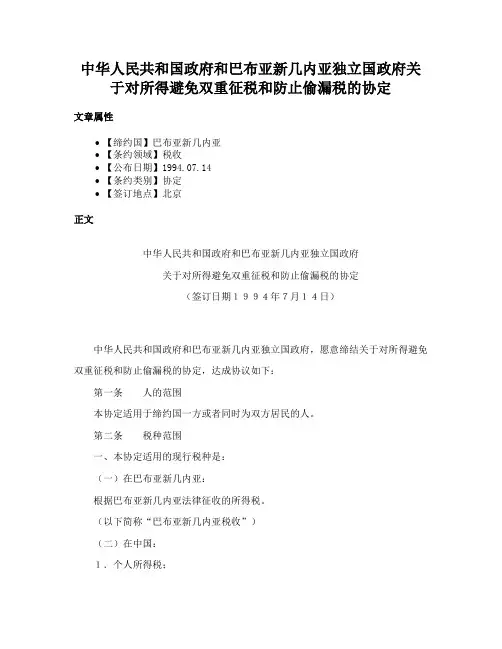
中华人民共和国政府和巴布亚新几内亚独立国政府关于对所得避免双重征税和防止偷漏税的协定文章属性•【缔约国】巴布亚新几内亚•【条约领域】税收•【公布日期】1994.07.14•【条约类别】协定•【签订地点】北京正文中华人民共和国政府和巴布亚新几内亚独立国政府关于对所得避免双重征税和防止偷漏税的协定(签订日期1994年7月14日)中华人民共和国政府和巴布亚新几内亚独立国政府,愿意缔结关于对所得避免双重征税和防止偷漏税的协定,达成协议如下:第一条人的范围本协定适用于缔约国一方或者同时为双方居民的人。
第二条税种范围一、本协定适用的现行税种是:(一)在巴布亚新几内亚:根据巴布亚新几内亚法律征收的所得税。
(以下简称“巴布亚新几内亚税收”)(二)在中国:1.个人所得税;2.外商投资企业和外国企业所得税;3.地方所得税。
(以下简称“中国税收”)二、本协定也适用于本协定签订之日后缔约国各方征收的属于增加或者代替第一款所列现行税种的相同或者实质相似的税收。
缔约国双方主管当局应将各自税法所作出的实质变动通知对方。
第三条一般定义一、在本协定中,除上下文另有解释的以外:(一)“巴布亚新几内亚”一语是指巴布亚新几内亚独立国,用于地理概念时,包括根据现行与国际法一致的有关开发大陆架的自然资源,其海底和底土的巴布亚新几内亚法律所规定的毗邻区域;(二)“中国”一语是指中华人民共和国;用于地理概念时,是指实施有关中国税收法律的所有中华人民共和国领土,包括领海,以及根据国际法,中华人民共和国拥有勘探和开发海底和底土资源以及海底以上水域资源的主权权利的领海以外的区域;(三)“缔约国一方”和“缔约国另一方”的用语,按照上下文,是指巴布亚新几内亚或者中国;(四)“人”一语包括个人、公司和其他团体;(五)“公司”一语是指法人团体或者在税收上视同法人团体的实体;(六)“缔约国一方企业”和“缔约国另一方企业”的用语,分别指缔约国一方居民经营的企业和缔约国另一方居民经营的企业;(七)“税收”一语按照上下文,是指巴布亚新几内亚税收或者中国税收;(八)“国民”一语是指:1.任何具有缔约国一方国籍的个人;2.任何按照缔约国一方现行法律取得其地位的法人、合伙组织、团体或其他实体;(九)“国际运输”一语是指缔约国一方居民企业以船舶或飞机经营的运输,不包括仅在缔约国另一方各地之间以船舶或飞机经营的运输;(十)“主管当局”一语:1.在巴布亚新几内亚方面是指国内收入局总局长或其授权的代表;2.在中国方面是指国家税务总局或其授权的代表。
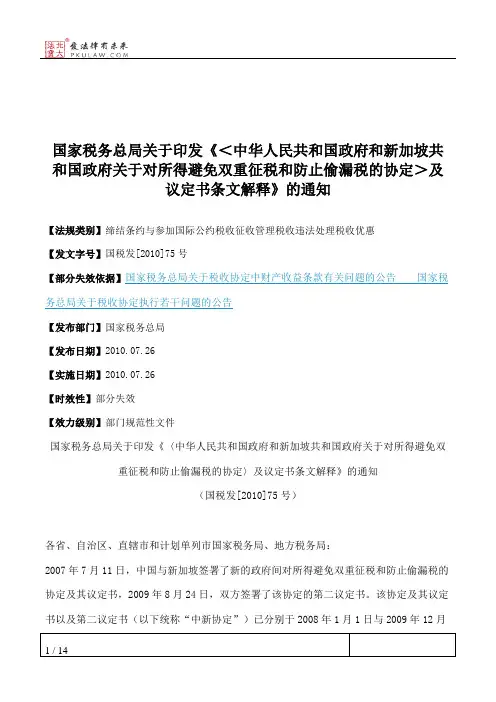
国家税务总局关于印发《<中华人民共和国政府和新加坡共和国政府关于对所得避免双重征税和防止偷漏税的协定>及议定书条文解释》的通知【法规类别】缔结条约与参加国际公约税收征收管理税收违法处理税收优惠【发文字号】国税发[2010]75号【部分失效依据】国家税务总局关于税收协定中财产收益条款有关问题的公告国家税务总局关于税收协定执行若干问题的公告【发布部门】国家税务总局【发布日期】2010.07.26【实施日期】2010.07.26【时效性】部分失效【效力级别】部门规范性文件国家税务总局关于印发《〈中华人民共和国政府和新加坡共和国政府关于对所得避免双重征税和防止偷漏税的协定〉及议定书条文解释》的通知(国税发[2010]75号)各省、自治区、直辖市和计划单列市国家税务局、地方税务局:2007年7月11日,中国与新加坡签署了新的政府间对所得避免双重征税和防止偷漏税的协定及其议定书,2009年8月24日,双方签署了该协定的第二议定书。
该协定及其议定书以及第二议定书(以下统称“中新协定”)已分别于2008年1月1日与2009年12月11日起执行。
根据中新协定、《维也纳条约法公约》、《中华人民共和国企业所得税法》及其实施条例、《中华人民共和国个人所得税法》及其实施条例,国家税务总局制定了《中华人民共和国政府和新加坡共和国政府关于对所得避免双重征税和防止偷漏税的协定》及议定书条文解释(以下简称中新协定条文解释),现印发给你们,请遵照执行。
在执行中新协定条文解释规定时,应注意:一、我国对外所签协定有关条款规定与中新协定条款规定内容一致的,中新协定条文解释规定同样适用于其他协定相同条款的解释及执行;二、中新协定条文解释与此前下发的有关税收协定解释与执行文件不同的,以中新协定条文解释为准;三、各地税务机关要组织有关干部认真学习中新协定条文解释,并在此基础上正确理解与执行税收协定;四、对执行中存在的问题请及时层报税务总局(国际税务司)。
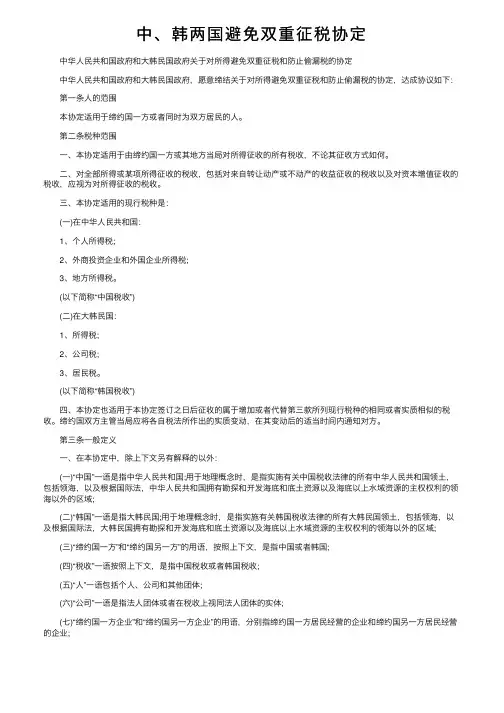
中、韩两国避免双重征税协定中华⼈民共和国政府和⼤韩民国政府关于对所得避免双重征税和防⽌偷漏税的协定中华⼈民共和国政府和⼤韩民国政府,愿意缔结关于对所得避免双重征税和防⽌偷漏税的协定,达成协议如下:第⼀条⼈的范围本协定适⽤于缔约国⼀⽅或者同时为双⽅居民的⼈。
第⼆条税种范围⼀、本协定适⽤于由缔约国⼀⽅或其地⽅当局对所得征收的所有税收,不论其征收⽅式如何。
⼆、对全部所得或某项所得征收的税收,包括对来⾃转让动产或不动产的收益征收的税收以及对资本增值征收的税收,应视为对所得征收的税收。
三、本协定适⽤的现⾏税种是:(⼀)在中华⼈民共和国:1、个⼈所得税;2、外商投资企业和外国企业所得税;3、地⽅所得税。
(以下简称“中国税收”)(⼆)在⼤韩民国:1、所得税;2、公司税;3、居民税。
(以下简称“韩国税收”)四、本协定也适⽤于本协定签订之⽇后征收的属于增加或者代替第三款所列现⾏税种的相同或者实质相似的税收。
缔约国双⽅主管当局应将各⾃税法所作出的实质变动,在其变动后的适当时间内通知对⽅。
第三条⼀般定义⼀、在本协定中,除上下⽂另有解释的以外:(⼀)“中国”⼀语是指中华⼈民共和国;⽤于地理概念时,是指实施有关中国税收法律的所有中华⼈民共和国领⼟,包括领海,以及根据国际法,中华⼈民共和国拥有勘探和开发海底和底⼟资源以及海底以上⽔域资源的主权权利的领海以外的区域;(⼆)“韩国”⼀语是指⼤韩民国;⽤于地理概念时,是指实施有关韩国税收法律的所有⼤韩民国领⼟,包括领海,以及根据国际法,⼤韩民国拥有勘探和开发海底和底⼟资源以及海底以上⽔域资源的主权权利的领海以外的区域;(三)“缔约国⼀⽅”和“缔约国另⼀⽅”的⽤语,按照上下⽂,是指中国或者韩国;(四)“税收”⼀语按照上下⽂,是指中国税收或者韩国税收;(五)“⼈”⼀语包括个⼈、公司和其他团体;(六)“公司”⼀语是指法⼈团体或者在税收上视同法⼈团体的实体;(七)“缔约国⼀⽅企业”和“缔约国另⼀⽅企业”的⽤语,分别指缔约国⼀⽅居民经营的企业和缔约国另⼀⽅居民经营的企业;。
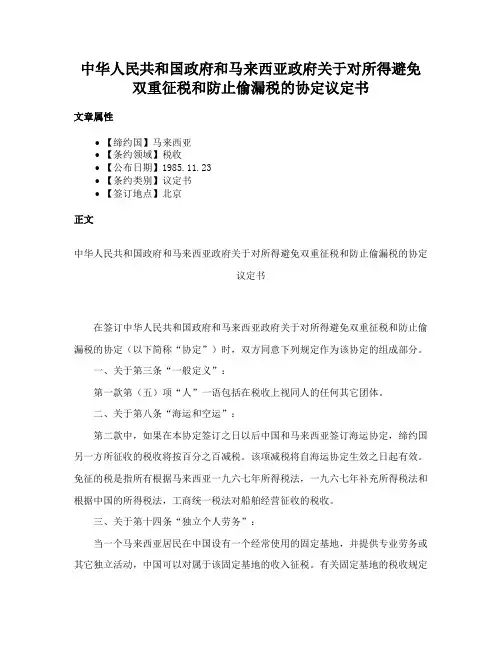
中华人民共和国政府和马来西亚政府关于对所得避免双重征税和防止偷漏税的协定议定书文章属性•【缔约国】马来西亚•【条约领域】税收•【公布日期】1985.11.23•【条约类别】议定书•【签订地点】北京正文中华人民共和国政府和马来西亚政府关于对所得避免双重征税和防止偷漏税的协定议定书在签订中华人民共和国政府和马来西亚政府关于对所得避免双重征税和防止偷漏税的协定(以下简称“协定”)时,双方同意下列规定作为该协定的组成部分。
一、关于第三条“一般定义”:第一款第(五)项“人”一语包括在税收上视同人的任何其它团体。
二、关于第八条“海运和空运”:第二款中,如果在本协定签订之日以后中国和马来西亚签订海运协定,缔约国另一方所征收的税收将按百分之百减税。
该项减税将自海运协定生效之日起有效。
免征的税是指所有根据马来西亚一九六七年所得税法,一九六七年补充所得税法和根据中国的所得税法,工商统一税法对船舶经营征收的税收。
三、关于第十四条“独立个人劳务”:当一个马来西亚居民在中国设有一个经常使用的固定基地,并提供专业劳务或其它独立活动,中国可以对属于该固定基地的收入征税。
有关固定基地的税收规定也适用于第十条第五款、第六款,第十一条第七款、第八款,第十二条第四款、第五款,第十三条第二款,第十四条第一款第(二)项,第十五条第二款第(三)项和第二十二条第二款。
“固定基地”一语在中国是指一个人提供某种专业劳务的固定活动场所。
四、关于第十九条“政府服务”:本协定第十九条中提供政府服务的职员还包括经缔约国双方主管当局共同承认的履行政府职责的其他人员(在马来西亚包括那些在法定机构中工作的职员)。
下列代表,经各自政府正式授权,已在本议定书上签字为证。
本议定书于一九八五年十一月二十三日在北京签订,一式两份,每份都用中文、马来文和英文写成,三种文本具有同等效力。
如在解释上遇有分歧,应以英文本为准。
注:本协定于一九八六年九月十四日生效。
中华人民共和国政府马来西亚政府代表代表吴学谦艾哈迈德·里陶丁(签字)(签字)。
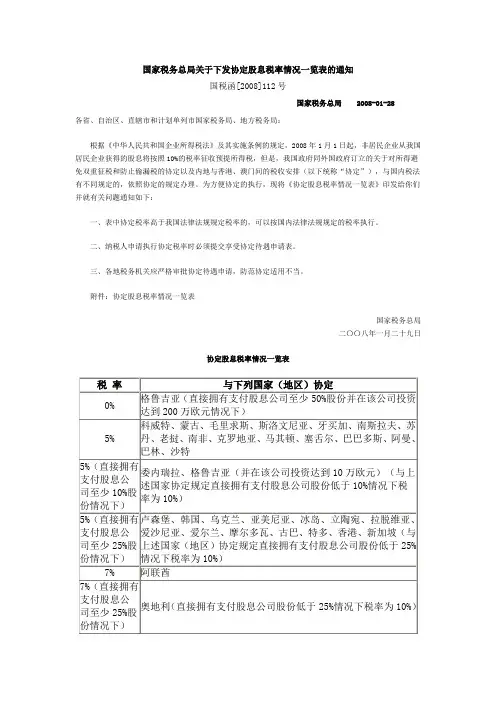
国家税务总局关于下发协定股息税率情况一览表的通知
国税函[2008]112号
国家税务总局2008-01-28
各省、自治区、直辖市和计划单列市国家税务局、地方税务局:
根据《中华人民共和国企业所得税法》及其实施条例的规定,2008年1月1日起,非居民企业从我国居民企业获得的股息将按照10%的税率征收预提所得税,但是,我国政府同外国政府订立的关于对所得避免双重征税和防止偷漏税的协定以及内地与香港、澳门间的税收安排(以下统称“协定”),与国内税法有不同规定的,依照协定的规定办理。
为方便协定的执行,现将《协定股息税率情况一览表》印发给你们并就有关问题通知如下:
一、表中协定税率高于我国法律法规规定税率的,可以按国内法律法规规定的税率执行。
二、纳税人申请执行协定税率时必须提交享受协定待遇申请表。
三、各地税务机关应严格审批协定待遇申请,防范协定适用不当。
附件:协定股息税率情况一览表
国家税务总局
二〇〇八年一月二十九日
协定股息税率情况一览表
附:国家税务总局国际税务司关于补充及更正协定股息税率情况一览表的通知。
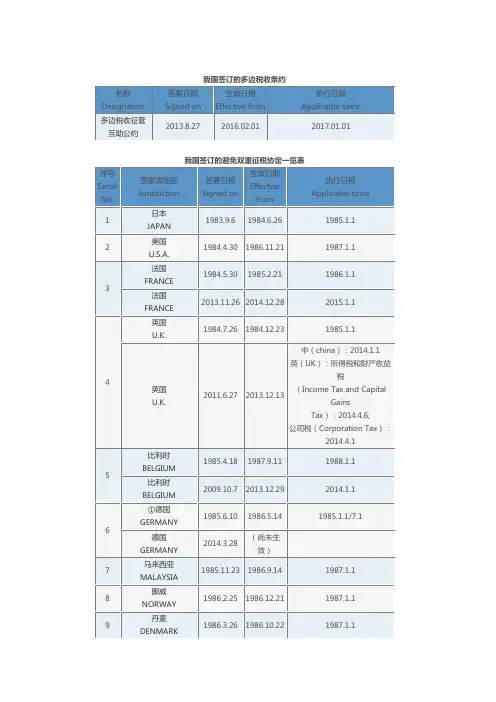
内地与港澳签订的避免双重征税安排一览表序号Serial No.地区Region签署日期Signed on生效日期Effective from执行日期Applicable since1 香港特别行政区HKSAR2006.8.21 2006.12.8内地(Mainland):2007.1.1香港(HKSAR):2007.4.12 澳门特别行政区MCSAR2003.12.27 2003.12.30 2004.1.1 大陆与台湾签订的避免双重征税协议序号Serial No.地区Region签署日期Signed on生效日期Effective from执行日期Applicable since1台湾Taiwan2015.8.25 (尚未生效)注:(1)截止2015年12月,我国已对外正式签署101个避免双重征税协定,其中97个协定已生效,和香港、澳门两个特别行政区签署了税收安排,与台湾签署了税收协议。
(2)①中国政府于1985年6月10日、1987年6月8日先后与德意志联邦共和国、德意志民主共和国政府签订避免对所得和财产双重征税协定、避免对所得双重征税和防止偷漏税协定。
1990年10月3日,德意志联邦共和国与德意志民主共和国统一为德意志联邦共和国,中国政府1985年6月10日与德意志联邦共和国政府签订的避免对所得和财产双重征税协定继续适用于中国和统一以后的德意志联邦共和国。
②中国政府于1987年6月11日与捷克斯洛伐克社会主义共和国政府签订避免对所得双重征税和防止偷漏税协定。
1990年,捷克斯洛伐克社会主义共和国先后改国名为捷克斯洛伐克联邦共和国、捷克和斯洛伐克联邦共和国,上述协定继续适用。
1993年1月1日,捷克和斯洛伐克联邦共和国分解为捷克共和国和斯洛伐克共和国,上述协定继续适用于中国和上述两国。
2009年8月28日,中国政府与捷克共和国政府签订避免对所得双重征税和防止偷漏税协定,该协定适用于捷克共和国。
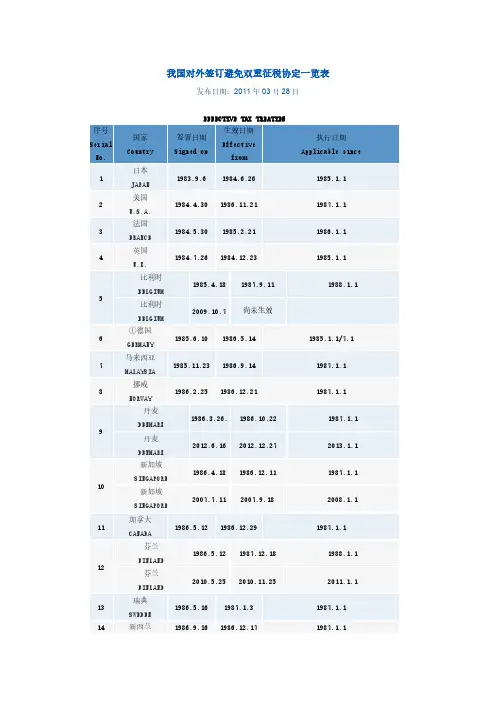
我国对外签订避免双重征税协定一览表发布日期:2011年03月28日序号Serial No.地区Region签署日期Signed on生效日期Effective from执行日期Applicable since1香港特别行政区HKSAR2006.8.212006.12.8内地 (Mainland):2007.1.1香港 (HKSAR):2007.4.12澳门特别行政区MCSAR2003.12.272003.12.302004.1.1注:(1)截止2011年5月底,我国已对外正式签署96个避免双重征税协定,其中93个协定已生效,和香港、澳门两个特别行政区签署了税收安排。
(2)加*号者表示中国政府与该国政府重新签订的避免对所得双重征税和防止偷漏税协定尚未生效。
(3)①中国政府于1985年6月10日、1987年6月8日先后与德意志联邦共和国、德意志民主共和国政府签订避免对所得和财产双重征税协定、避免对所得双重征税和防止偷漏税协定。
1990年10月3日,德意志联邦共和国与德意志民主共和国统一为德意志联邦共和国,中国政府1985年6月10日与德意志联邦共和国政府签订的避免对所得和财产双重征税协定继续适用于统一以后的德意志联邦共和国。
②中国政府于1987年6月11日与捷克和斯洛伐克社会主义共和国政府签订避免对所得双重征税和防止偷漏税协定。
1990年,捷克和斯洛伐克社会主义共和国先后改国名为捷克斯洛伐克联邦共和国、捷克和斯洛伐克联邦共和国,上述协定继续适用。
1993年1月1日,捷克和斯洛伐克联邦共和国分解为捷克共和国和斯洛伐克共和国,上述协定继续适用于斯洛伐克共和国。
2009年8月28日,中国政府与捷克共和国政府签订避免对所得双重征税和防止偷漏税协定,该协定适用于捷克共和国。
③中国政府于1988年12月2日与南斯拉夫社会主义联邦共和国议会联邦执行委员会(前南斯拉夫政府)签订避免对所得和财产双重征税协定,后前南斯拉夫解体,据外交部告,该协定由解体后的各国继承,中国政府陆续与解体后的各国政府签订避免对所得和财产双重征税协定,仅有波黑政府未单独签订,上述协定继续适用于波黑。
AGREEMENTBETWEENTHE GOVERNMENT OF THE PEOPLE’S REPUBLIC OF CHINA AND THE GOVERNMENT OF THE REPUBLIC OF AZERBAIJAN FOR THE AVOIDANCE OF DOUBLE TAXATION AND THE PREVENTION OF FISCAL EVASION WITHRESPECT TO TAXES ON INCOMEThe Government of the People’s Republic of China and the Government of the Republic of AzerbaijanDesiring to conclude an Agreement for the avoidance of double taxation and the prevention of fiscal evasion with respect to taxes on income,Have agreed as follows:Article 1Personal ScopeThis Agreement shall apply to persons who are residents of one or both of the Contracting States.Article 2Taxes Covered1. This Agreement shall apply to taxes on income imposed on behalf of a Contracting State or of its local authorities, irrespective of the manner in which they are levied.2. There shall be regarded as taxes on income all taxes imposed on total income, or on elements of income, including taxes on gains from the alienation of movable or immovable property, taxes on the total amounts of wages or salaries paid by enterprises, as well as taxes on capital appreciation.3. The existing taxes to which the Agreement shall apply are in particular:(a) in China:i) the individual income tax;ii) the income tax for enterprises with foreign investment and foreign enterprises.(hereinafter referred to as "Chinese tax")(b) in Azerbaijan:i) the tax on profit of legal persons;ii) the income tax on individuals;(hereinafter referred to as “Azerbaijan taxes")4. The Agreement shall also apply to any identical or substantially similar taxes that are imposed after the date of signature of the Agreement in addition to, or in place of, the existing taxes. The competent authorities of the Contracting States shall notify each other of any substantial changes, which have been made in their respective taxation laws.Article 3General Definitions1. For the purposes of this Agreement, unless the context otherwise requires:(a) the term "China" means the People's Republic of China; when used ingeographical sense, means all the territory of the People's Republic ofChina, including its territorial sea, in which the Chinese laws relating totaxation apply, and any area beyond its territorial sea, within which the People's Republic of China has sovereign rights of exploration for andexploitation of resources of the sea-bed and its sub-soil and superjacentwater resources in accordance with international law;(b) the term “Azerbaijan" means the territory of the Republic of Azerbaijan,including the Caspian Sea (Lake) sector belonging to the Republic ofAzerbaijan, the air space above the Republic of Azerbaijan, within which the sovereign rights and jurisdiction of the Republic of Azerbaijan isimplemented in respect to subsoil, sea bed and natural resources and anyother area which has been or may hereinafter be determined in accordancewith international law and legislation of the Republic of Azerbaijan;(c) the terms "a Contracting State" and "the other Contracting State" meanChina or Azerbaijan as the context requires;(d) the term “tax” means Chinese tax or Azerbaijan tax as the context requires;(e) the term "person" includes an individual, a company and any other body ofpersons;(f) the term "company" means any body corporate or any entity that is treated asa body corporate for tax purposes;(g) the terms "enterprise of a Contracting State" and "enterprise of the otherContracting State" mean respectively an enterprise carried on by a residentof a Contracting State and an enterprise carried on by a resident of the other Contracting State;(h) the term “international traffic”means any transport by a ship or aircraftoperated by an enterprise of a Contracting State, except when the ship oraircraft is operated solely between places in the other Contracting State;(i) the term "national" means:i) any individual possessing the nationality of a Contracting State;ii) any legal person, partnership or association deriving its status as such from the laws in force in a Contracting State;(j) the term "competent authority" means, in the case of China, the State Administration of Taxation or its authorized representative, and, in the case of Azerbaijan, the Ministry of Taxes and the Ministry of Finance.2. As regards the application of the Agreement at any time by a Contracting State, any term not defined therein shall, unless the context otherwise requires, have the meaning that it has at that time under the law of that State for the purposes of the taxes to which the Agreement applies, any meaning under the applicable tax laws of that State prevailing over a meaning given to the term under other laws of that State.Article 4Resident1. For the purposes of this Agreement, the term "resident of a Contracting State" means any person who, under the laws of that State, is liable to tax therein by reason of his domicile, residence, place of head office, place of registration, place of management or any other criterion of a similar nature, and also includes that State or local authority thereof. This term, however, does not include any person who is liable to tax in that State in respect only of income from sources in that State.2. Where by reason of the provisions of paragraph 1 an individual is a resident of both Contracting States, then his status shall be determined as follows:(a) he shall be deemed to be a resident only of the State in which he has apermanent home available to him; if he has a permanent home available tohim in both States, he shall be deemed to be a resident only of the State with which his personal and economic relations are closer (center of vitalinterests);(b) if the State in which he has his center of vital interests cannot be determined,or if he has not a permanent home available to him in either State, he shallbe deemed to be a resident only of the State in which he has an habitualabode;(c) if he has an habitual abode in both States or in neither of them, he shall bedeemed to be a resident only of the State of which he is a national;(d) if he is a national of both States or of neither of them, the competentauthorities of the Contracting States shall settle the question by mutual agreement.3. Where by reason of the provisions of paragraph 1, a person other than an individual is a resident of both Contracting States, then it shall be deemed to be a resident only of the State in which its place of effective management is situated.Article 5Permanent Establishment1. For the purposes of this Agreement, the term "permanent establishment" meansa fixed place of business through which the business of an enterprise is wholly or partly carried on.2. The term "permanent establishment" includes especially:(a) a place of management;(b) a branch;(c) an office;(d) a factory;(d) a workshop; and(f) a mine, an oil or gas well, a quarry or any other place of extraction of naturalresources.3. The term “permanent establishment” shall also be deemed to include:(a) a building site or construction or installation project, or supervisory activitiesin connection therewith, but only if such site, project or activities continue for more than twelve months;(b) an installation, structure or vessel or any other place used for the explorationof natural resources, but only if this exploration lasts for a period or periods aggregating more than three months within any twelve month period;(c) the furnishing of services, including consultancy services, by an enterprisethrough its employees or other personnel engaged by the enterprise forsuch purpose, but only where activities of that nature continue for a period or periods aggregating more than six months within any twelve month period.4. Notwithstanding the preceding provisions of this article, the term "permanent establishment" shall be deemed not to include:(a) the use of facilities solely for the purpose of storage, display or delivery ofgoods or merchandise belonging to the enterprise;(b) the maintenance of a stock of goods or merchandise belonging to theenterprise solely for the purpose of storage, display or delivery;(c) the maintenance of a stock of goods or merchandise belonging to theenterprise solely for the purpose of processing by another enterprise;(d) the maintenance of a fixed place of business solely for the purpose ofpurchasing goods or merchandise or of collecting information, for theenterprise;(e) the maintenance of a fixed place of business solely for the purpose ofcarrying on, for the enterprise, any other activity of a preparatory or auxiliary character;(f) the maintenance of a fixed place of business solely for any combination ofactivities mentioned in sub-paragraphs a) to e), provided that the overall activity of the fixed place of business resulting from this combination is of a preparatory or auxiliary character.5. Notwithstanding the provisions of paragraphs 1 and 2, where a person - other than an agent of an independent status to whom paragraph 6 applies - is acting in a Contracting State on behalf of an enterprise of the other Contracting State, has and habitually exercises an authority to conclude contracts in the name of the enterprise, that enterprise shall be deemed to have a permanent establishment in the first-mentioned Contracting State in respect of any activities which that person undertakes for the enterprise, unless the activities of such person are limited to those mentioned in paragraph 4 which, if exercised through a fixed place of business, would not make this fixed place of business a permanent establishment under the provisions of that paragraph.6. An enterprise of a Contracting State shall not be deemed to have a permanent establishment in the other Contracting State merely because it carries on business in that other State through a broker, general commission agent or any other agent of an independent status, provided that such persons are acting in the ordinary course of their business. However, when the activities of such an agent are devoted wholly or almost wholly on behalf of that enterprise, and conditions are made or imposed between that enterprise and the agent in their commercial and financial relationswhich differ from those which would have been made between independent enterprises, he will not be considered an agent of an independent status within the meaning of this paragraph.7. The fact that a company which is a resident of a Contracting State controls or is controlled by a company which is a resident of the other Contracting State, or which carries on business in that other State (whether through a permanent establishment or otherwise), shall not of itself constitute either company a permanent establishment of the other.Article 6Income from Immovable Property1. Income derived by a resident of a Contracting State from immovable property (including income from agriculture or forestry) situated in the other Contracting State may be taxed in that other State.2. The term "immovable property" shall have the meaning which it has under the law of the Contracting State in which the property in question is situated. The term shall in any case include property accessory to immovable property, livestock and equipment used in agriculture and forestry, rights to which the provisions of general law respecting landed property apply, usufruct of immovable property and rights to variable or fixed payments as consideration for the working of, or the right to work, mineral deposits, sources and other natural resources; ships and aircraft shall not be regarded as immovable property.3. The provisions of paragraph 1 shall also apply to income derived from the direct use, letting, or use in any other form of immovable property.4. The provisions of paragraphs 1 and 3 shall also apply to the income from immovable property of an enterprise and to income from immovable property used for the performance of independent personal services.Article 7Business Profits1. The profits of an enterprise of a Contracting State shall be taxable only in that State unless the enterprise carries on business in the other Contracting State through a permanent establishment situated therein. If the enterprise carries on business as aforesaid, the profits of the enterprise may be taxed in the other State but only so much of them as is attributable to that permanent establishment.2. Subject to the provisions of paragraph 3, where an enterprise of a Contracting State carries on business in the other Contracting State through a permanent establishment situated therein, there shall in each Contracting State be attributed to that permanent establishment the profits which it might be expected to make if itwere a distinct and separate enterprise engaged in the same or similar activities under the same or similar conditions and dealing wholly independently with the enterprise of which it is a permanent establishment.3. In determining the profits of a permanent establishment, there shall be allowed as deductions expenses which are incurred for the purposes of the business of the permanent establishment, including executive and general administrative expenses so incurred, whether in the State in which the permanent establishment is situated or elsewhere.4. Insofar as it has been customary in a Contracting State to determine the profits to be attributed to a permanent establishment on the basis of an apportionment of the total profits of the enterprise to its various parts, nothing in paragraph 2 shall preclude that Contracting State from determining the profits to be taxed by such an apportionment as may be customary; the method of apportionment adopted shall, however, be such that the result shall be in accordance with the principles contained in this Article.5. No profits shall be attributed to a permanent establishment by reason of the mere purchase by that permanent establishment of goods or merchandise for the enterprise.6. For the purposes of the preceding paragraphs, the profits to be attributed to the permanent establishment shall be determined by the same method year by year unless there is good and sufficient reason to the contrary.7. Where profits include items of income which are dealt with separately in other Articles of this Agreement, then the provisions of those Articles shall not be affected by the provisions of this Article.Article 8Shipping and Air Transport1. Profits of an enterprise of a Contracting State from the operation of ships or aircraft in international traffic shall be taxable only in that State.2. The provisions of paragraph 1 shall also apply to profits from the participation ina pool, a joint business or an international operating agency.Article 9Associated Enterprises1. Where(a) an enterprise of a Contracting State participates directly or indirectly in themanagement, control or capital of an enterprise of the other Contracting State, or(b) the same persons participate directly or indirectly in the management, controlor capital of an enterprise of a Contracting State and an enterprise of the other Contracting State, and in either case conditions are made or imposed between the two enterprises in their commercial or financial relations which differ from those which would be made between independent enterprises, then any profits which would, but for those conditions, have accrued to one of the enterprises, but, by reason of those conditions, have not so accrued, may be included in the profits of that enterprise and taxed accordingly.2. Where a Contracting State includes in the profits of an enterprise of that State - and taxes accordingly - profits on which an enterprise of the other Contracting State has been charged to tax in that other State and the profits so included are profits which would have accrued to the enterprise of the first-mentioned State if the conditions made between the two enterprises had been those which would have been made between independent enterprises, then that other State shall make an appropriate adjustment to the amount of the tax charged therein on those profits. In determining such adjustment, due regard shall be had to the other provisions of this Agreement and the competent authorities of the Contracting States shall if necessary consult each other.Article 10Dividends1. Dividends paid by a company which is a resident of a Contracting State to a resident of the other Contracting State may be taxed in that other State.2. However, such dividends may also be taxed in the Contracting State of which the company paying the dividends is a resident and according to the laws of that State, but if the beneficial owner of the dividends is a resident of the other Contracting State, the tax so charged shall not exceed ten percent (10%) of the gross amount of the dividends.This paragraph shall not affect the taxation of the company in respect of the profits out of which the dividends are paid.3. The term "dividends" as used in this Article means income from shares, “jouissance” shares or “jouissance” rights, mining shares, founders’ shares or other rights, not being debt-claims, participating in profits, as well as income from other corporate rights which is subjected to the same taxation treatment as income from shares by the laws of the State of which the company making the distribution is a resident.4. The provisions of paragraphs 1 and 2 shall not apply if the beneficial owner of the dividends, being a resident of a Contracting State, carries on business in the other Contracting State of which the company paying the dividends is a resident, through a permanent establishment situated therein, or performs in that other State independent personal services from a fixed base situated therein, and the holding in respect of which the dividends are paid is effectively connected with such permanent establishment or fixed base. In such case the provisions of Article 7 or Article 14, as the case may be, shall apply.5. Where a company which is a resident of a Contracting State derives profits or income from the other Contracting State, that other State may not impose any tax on the dividends paid by the company, except insofar as such dividends are paid to a resident of that other State or insofar as the holding in respect of which the dividends are paid is effectively connected with a permanent establishment or a fixed base situated in that other State, nor subject the company's undistributed profits to a tax on the company's undistributed profits, even if the dividends paid or the undistributed profits consist wholly or partly of profits or income arising in such other State.Article 11Interest1. Interest arising in a Contracting State and paid to a resident of the other Contracting State may be taxed in that other State.2. However, such interest may also be taxed in the Contracting State in which it arises and according to the laws of that State, but if the beneficial owner of the interest is a resident of the other Contracting State, the tax so charged shall not exceed ten percent (10%) of the gross amount of the interest.3. Notwithstanding the provisions of paragraph 2, interest arising in a Contracting State and derived and beneficially owned by the Government of the other Contracting State, including its local authorities, the Central Bank thereof or any financial institution wholly owned by the Government, or interest derived on loans guaranteed by that Government or any financial institution wholly owned by that Government shall be exempt from tax in the first-mentioned State. The term “financial institution wholly owned by the Government”include in particular, in the case of China, the State Development Bank of China, the Export – Import Bank of China, the Agricultural Development Bank of China, the National Council for Social Security Fund, the Bank of China, the Construction Bank of China, the Industrial and Commercial Bank of China and the Agricultural Bank of China; and in the case of Azerbaijan, the National Bank of the Republic of Azerbaijan and the State Oil Fund of the Republic of Azerbaijan.4. The term “interest”as used in this Article means income from debt-claims of every kind, whether or not secured by mortgage and whether or not carrying a right to participate in the debtor's profits, and in particular, income from governmentsecurities and income from bonds or debentures, including premiums and prizes attaching to such securities, bonds or debentures. Penalty charges for late payment shall not be regarded as interest for the purpose of this Article.5. The provisions of paragraphs 1, 2 and 3 shall not apply if the beneficial owner of the interest, being a resident of a Contracting State, carries on business in the other Contracting State in which the interest arises, through a permanent establishment situated therein, or performs in that other State independent personal services from a fixed base situated therein, and the debt-claim in respect of which the interest is paid is effectively connected with such permanent establishment or fixed base. In such case the provisions of Article 7 or Article 14, as the case may be, shall apply.6. Interest shall be deemed to arise in a Contracting State when the payer is the Government of that State, a local authority thereof or a resident of that State. Where, however, the person paying the interest, whether he is a resident of a Contracting State or not, has in a Contracting State a permanent establishment or a fixed base in connection with which the indebtedness on which the interest is paid was incurred, and such interest is borne by such permanent establishment or fixed base, then such interest shall be deemed to arise in the State in which the permanent establishment or fixed base is situated.7. Where, by reason of a special relationship between the payer and the beneficial owner or between both of them and some other person, the amount of the interest, having regard to the debt-claim for which it is paid, exceeds the amount which would have been agreed upon by the payer and the beneficial owner in the absence of such relationship, the provisions of this Article shall apply only to the last-mentioned amount. In such case, the excess part of the payments shall remain taxable according to the laws of each Contracting State, due regard being had to the other provisions of this Agreement.Article 12Royalties1. Royalties arising in a Contracting State and paid to a resident of the other Contracting State may be taxed in that other State.2. However, such royalties may also be taxed in the Contracting State in which it arises and according to the laws of that State, but if the beneficial owner of the royalties is a resident of the other Contracting State, the tax so charged shall not exceed ten percent (10%) of the gross amount of the royalties.3. The term "royalties" as used in this Article means payments of any kind received as a consideration for the use of, or the right to use, any copyright of literary, artistic or scientific work including cinematography films, or films or tapes for radio or television broadcasting, any patent, trade mark, design or model, plan, secret formula or process, or for the use of, or the right to use, industrial, commercial orscientific equipment or for information concerning industrial, commercial or scientific experience.4. The provisions of paragraphs 1 and 2 shall not apply if the beneficial owner of the royalties, being a resident of a Contracting State, carries on business in the other Contracting State in which the royalties arise, through a permanent establishment situated therein, or performs in that other State independent personal services from a fixed base situated therein, and the right or property in respect of which the royalties are paid is effectively connected with such permanent establishment or fixed base. In such case the provisions of Article 7 or Article 14, as the case may be, shall apply.5. Royalties shall be deemed to arise in a Contracting State when the payer is the Government of that State, a local authority thereof or a resident of that State. Where, however, the person paying the royalties, whether he is a resident of a Contracting State or not, has in a Contracting State a permanent establishment or a fixed base in connection with which the liability to pay the royalties was incurred, and such royalties are borne by such permanent establishment or fixed base, then such royalties shall be deemed to arise in the State in which the permanent establishment or fixed base is situated.6. Where, by reason of a special relationship between the payer and the beneficial owner or between both of them and some other person, the amount of the royalties, having regard to the use, right or information for which they are paid, exceeds the amount which would have been agreed upon by the payer and the beneficial owner in the absence of such relationship, the provisions of this Article shall apply only to the last-mentioned amount. In such case, the excess part of the payments shall remain taxable according to the laws of each Contracting State, due regard being had to the other provisions of this Agreement.Article 13Capital Gains1. Gains derived by a resident of a Contracting State from the alienation of immovable property referred to in Article 6 and situated in the other Contracting State may be taxed in that other State.2. Gains from the alienation of movable property forming part of the business property of a permanent establishment which an enterprise of a Contracting State has in the other Contracting State or of movable property pertaining to a fixed base available to a resident of a Contracting State in the other Contracting State for the purpose of performing independent personal services, including such gains from the alienation of such a permanent establishment (alone or with the whole enterprise) or of such a fixed base, may be taxed in that other State.3. Gains derived by an enterprise of a Contracting State from the alienation of ships or aircraft operated in international traffic, or movable property pertaining to the operation of such ships or aircraft, shall be taxable only in that Contracting State.4. Gains from the alienation of shares of the capital stock of a company, the property of which consists directly or indirectly principally of immovable property situated in a Contracting State may be taxed in that Contracting State.5. Gains from the alienation of any property other than that referred to in paragraphs 1 to 4, shall be taxable only in the Contracting State of which the alienator is a resident.Article 14Independent Personal Services1. Income derived by a resident of a Contracting State in respect of professional services or other activities of an independent character shall be taxable only in that State except in the following circumstances, when such income may also be taxed in the other Contracting State:(a) if he has a fixed base regularly available to him in the other Contracting Statefor the purpose of performing his activities; in that case, only so much of the income as is attributable to that fixed base may be taxed in that other State;or(b) if his stay in the other Contracting State is for a period or periods amountingto or exceeding in the aggregate 183 days in the calendar year concerned;in that case, only so much of the income as is derived from his activitiesperformed in that other State may be taxed in that other State.2. The term "professional services" includes especially independent scientific, literary, artistic, educational or teaching activities as well as the independent activities of physicians, lawyers, engineers, architects, dentists and accountants.Article 15Dependent Personal Services1. Subject to the provisions of Articles 16, 18, 19 and 20, salaries, wages and other similar remuneration derived by a resident of a Contracting State in respect of an employment shall be taxable only in that State unless the employment is exercised in the other Contracting State. If the employment is so exercised, such remuneration as is derived therefrom may be taxed in that other State.2. Notwithstanding the provisions of paragraph 1, remuneration derived by a resident of a Contracting State in respect of an employment exercised in the other Contracting State shall be taxable only in the first-mentioned State if:。
国家税务总局关于下发协定股息税率情况一览表的通知2008年1月29日,国家税务总局针对新执行的企业所得税法与部分国家签订的避免双重征税协定,及内地与香港、澳门的税收安排可能存在冲突,统一印发了关于中国与各国协定股息一览表,以保证其正常执行。
如下援引通知原文及协定股息税率附表,以供您做参考:国税函国税函〔〔2008〕112号 各省、自治区、直辖市和计画单列市国家税务局、地方税务局:根据《中华人民共和国企业所得税法》及其实施条例的规定,2008年1月1日起,非居民企业从我国居民企业获得的股息将按照10%的税率征收预提所得税,但是,我国政府同外国政府订立的关于对所得避免双重征税和防止偷漏税的协定以及内地与香港、澳门间的税收安排(以下统称"协定"),与国内税法有不同规定的,依照协定的规定办理。
为方便协定的执行,现将《协定股息税率情况一览表》印发给你们并就有关问题通知如下:一、表中协定税率高于我国法律法规规定税率的,可以按国内法律法规规定的税率执行。
二、纳税人申请执行协定税率时必须提交享受协定待遇申请表。
三、各地税务机关应严格审批协定待遇申请,防范协定适用不当。
附件:协定股息税率情况一览表国家税务总局二〇〇八年一月二十九日请参阅以下附件,协定股息税率一览表详细地列明了各境外注册地之税率。
从中,我司认为以最低税率5%之范围内的毛里求斯、塞舌耳、新加坡以及香港四处境外注册地均较适合中国客户的要求及公司架构,仔细对比研究以上四处,会发现她们各有差异。
为节省您宝贵的时间,宏杰集团在此为您分析当中差别,以便您能根据具体投资要求,选择最理想之公司架构。
(1)毛里求斯――作为印度洋中面积不足两千平方公里的岛国,毛里求斯的政局稳定、税率较低,从而吸引不少商人使用毛里求斯公司从事海外投资活动。
而毛里求斯独有的商业法,可避免公司产生国际纠纷时,损及个人资产或是母公司的信誉问题。
但针无两头尖,毛里求斯的尽职调查要求严格、公司维护费用较高也会令商人们难以抉择;另外,不论是离岸公司或国际公司,其公司档虽可使用英法文以外的任何语言,但必须附带经认证的英文翻译版本,此举对中国客户而言无疑较为繁琐。
中华人民共和国政府和芬兰共和国政府关于对所得避免双重征税和防止漏税的协定的议定书文章属性•【缔约国】芬兰•【条约领域】税收•【公布日期】1986.05.12•【条约类别】议定书•【签订地点】赫尔辛基正文议定书在签订中华人民共和国政府和芬兰共和国政府关于对所得避免双重征税和防止偷漏税的协定(以下简称“协定”)时,下列代表同意下规定应作为协定的组成部分:一、关于第四条第二款同时为缔约国双方居民的个人,缔约国双方在通过协议确定其身份时,应参加一九八○年联合国关于发达国家与发展中国避免双重征税协定范本第四条第二款的规定。
二、关于第六条拥有缔约国一方居民公司的股份或其它公司权利的人有权享有该公司不动产的股份或其它公司权利,从直接使用、出租或以其它任何形式享用该权利取得的所得,可以在该不动产所在的缔约国征税。
三、关于第八条本协定不影响中华人民共和国政府和芬兰共和国政府一九七七年一月二十七日在赫尔辛基签署的海运协定有关税收条款的执行。
四、关于第十一条第三款虽有第十一条第三款的规定,在芬兰方面,芬兰出口信贷有限公司或芬兰工业发展合作基金会提供的贷款和信贷;在中国方面,中国银行或中国国际信托投资公司提供的贷款和信贷,应视同完全由缔约国一方提供资金的债权。
五、关于第十二条第二款虽有本协定第十二条第二款的规定,对使用或有权使用工业、商业、科学设备所取得的作为报酬的特许权使用费的征税,不应超过该特权使用费总额百分之七十的数额的百分之十。
下列代表,经正式授权,已在本议定书上签字为证。
本议定书于一九八六年五月十二日在赫尔辛基签订,一式两份,每份都用中文、芬兰文和英文写成,三种文本具有同等效力,如在解释上遇有分歧,应以英文本为准。
中华人民共和国政府芬兰共和国政府代表代表吴学谦(签字)韦于吕宁(签字)。
中华人民共和国政府和荷兰王国政府关于对所得避免双重征税和防止偷漏税的协定文章属性•【缔约国】荷兰•【条约领域】税收•【公布日期】1987.07.13•【条约类别】协定•【签订地点】北京正文中华人民共和国政府和荷兰王国政府关于对所得避免双重征税和防止偷漏税的协定(一九八八年三月五日生效)中华人民共和国政府和荷兰王国政府,愿意缔结关于对所得避免双重征税和防止偷漏税的协定,达成协议如下:第一条人的范围本协定适用于缔约国一方或者同时为双方居民的人。
第二条税种范围一、本协定适用于由缔约国一方或其地方当局对所得征收的所有税收,不论其征收方式如何。
二、对全部所得或某项所得征收的税收,包括对来自转让动产或不动产的收益征收的税收以及对资本增值征收的税收,应视为对所得征收的税收。
三、本协定适用的现行税种是:(一)在荷兰:1.所得税;2.工资税;3.公司税(包括开发自然资源净利润中的政府股份);4.股息税。
(以下简称“荷兰税收”)(二)在中国;1.个人所得税;2.中外合资经营企业所得税;3.外国企业所得税;4.地方所得税。
(以下简称“中国税收”)四、本协定也适用于本协定签订之日后增加或者代替第三款所列现行税种的相同或者实质相似的税收。
缔约国双方主管当局应将各种税法所作的实质变动,在其变动后的适当时间内通知对方。
第三条一般定义一、在本协定中,除上下文另有解释的以外:(一)“缔约国一方”和“缔约国另一方”的用语,按照上下文,是指荷兰或者中国;(二)“荷兰”一语是指位于欧洲的荷兰王国部分,包括按照国际法已经标明或根据荷兰法律以后可能标明的荷兰可以对其行使勘探和开发自然资源权利的北海海底和其底土部分;(三)“中国”一语是指中华人民共和国;用于地理概念时,是指实施有关中国税收法律的所有中华人民共和国领土,包括领海,以及根据国际法,中华人民共和国拥有勘探和开发海底和底土资源以及海底以上水域资源的主权权利的领海以外的区域;(四)“人”一语包括个人、公司和其它团体;(五)“公司”一语是指法人团体或者在税收上视同法人团体的实体;(六)“缔约国一方企业”和“缔约国另一方企业”的用语,分别指缔约国一方居民经营的企业和缔约国另一方居民经营的企业;(七)“国际运输”一语是指在缔约国一方设有总机构或实际管理机构的企业以船舶或飞机经营的运输,不包括仅在缔约国另一方各地之间以船舶或飞机经营的运输;(八)“国民”一语是指:1.所有具有缔约国一方国籍的个人;2.所有按照缔约国一方现行法律取得法律地位的法人、合伙企业、团体和其它实体;(九)“主管当局”一语,1.在荷兰方面是指财政部长或其授权的代表;2.在中国方面是指财政部或其授权的代表。
中华人民共和国政府和巴西联邦共和国政府关于对所得避免双重征税和防止偷漏税的协定文章属性•【缔约国】巴西•【条约领域】税收•【公布日期】1991.08.05•【条约类别】协定•【签订地点】北京正文中华人民共和国政府和巴西联邦共和国政府关于对所得避免双重征税和防止偷漏税的协定中华人民共和国政府和巴西联邦共和国政府,愿意缔结关于对所得避免双重征税和防止偷漏税的协定,达成协议如下:第一条人的范围本协定适用于缔约国一方或者同时为双方居民的人。
第二条税种范围一、本协定适用的现行税种是:(一)在巴西方面:联邦所得税,不包括追加所得税和对次要活动征收的税收。
(以下简称“巴西税收”)(二)在中华人民共和国方面:1.个人所得税;2.中外合资经营企业所得税;3.外国企业所得税;4.地方所得税。
(以下简称“中国税收”)二、本协定也适用于本协定签订之日后增加或者代替上述现行税种的相同或者实质相似的税收。
缔约国双方主管当局应将各自税法所作的实质变动通知对方。
第三条一般定义一、在本协定中,除上下文另有解释的以外:(一)“巴西”一语是指巴西联邦共和国;(二)“中国”一语是指中华人民共和国;用于地理概念时,是指实施有关中国税收法律的所有中华人民共和国领土,包括领海,以及根据国际法,中华人民共和国拥有勘探和开发海底和底土资源以及海底以上水域资源的主权权利的领海以外的区域;(三)“缔约国一方”和“缔约国另一方”的用语,按照上下文,是指巴西和中国;(四)“税收”一语按照上下文,是指巴西税收或者中国税收;(五)“人”一语包括个人、公司和其他团体;(六)“公司”一语是指法人团体或者在税收上视同法人团体的实体;(七)“缔约国一方企业”和“缔约国另一方企业”的用语,分别指缔约国一方居民经营的企业和缔约国另一方居民经营的企业;(八)“国民”一语是指所有具有缔约国一方国籍的个人和所有按照该缔约国法律建立或者组织的法人,以及所有在税收上视同按照该缔约国法律建立或者组织成法人的所有非法人团体;(九)“国际运输”一语是指缔约国一方设有总机构(即实际管理机构)的企业以船舶或飞机经营的运输,不包括仅在缔约国另一方各地之间以船舶或飞机经营的运输;(十)“主管当局”一语:1.在巴西方面,是指经济、财政和计划部长、联邦税务局,或其授权的代表;2.在中国方面,是指国家税务局或其授权的代表。
议定书
关于一九八五年十一月二十三日签订的中华人民共和国政府和马来西亚政府关于对所得避免双重征税和防止偷漏税的协定(以下简称“协定”),双方同意下述规定应作为该协定的组成部分。
关于第八条“海运和空运”:
在第一款中,对以飞机经营国际运输业务免征的税收,在马来西亚是指根据一九六七年所得税法、一九六七年补充所得税法,以及本议定书签署后马来西亚可能征收的任何类似中国营业税所征收的各项税收;在中国是指根据所得税法、营业税条例征收的所得税及其地方所得税、营业税。
上述免税应自本议定书签署之日起有效。
下列代表,经各自政府正式授权,已在本议定书上签字为证。
本议定书于二○○○年六月五日在北京签订,一式两份,每份都用中文、马来文和英文写成,三种文本同等作准。
如在解释上遇有分歧,应以英文本为准。
中华人民共和国政府马来西亚政府
代表代表
国家税务总局副局长驻华大使
程法光马吉德。
乐税智库文档财税法规
策划 乐税网乐税网( http://www.leshui365.com/ )邮箱: Jiufu@leshui365.com国家税务总局关于印发中国和老挝两国政府避免双重征税协定文本并请做好执行准备的通知
【标 签】请做好执行准备通知,双重征税协定文本,中国老挝政府避免【颁布单位】国家税务总局【文 号】国税函﹝1999﹞60号【发文日期】1999-04-01【实施时间】1999-04-01【 有效性 】全文有效【税 种】征收管理
各省、自治区、直辖市和计划单列市国家税务局、地方税务局: 我国政府和老挝人民民主共和国政府关于对所得避免双重征税和防止偷漏税的协定,已于1999年1月25日在北京正式签署。该协定还有待双方完成各自所需法律程序后生效执行。现将该协定文本印发给你们,请做好执行前的准备工作。
附件:中华人民共和国政府和老挝人民民主共和国政府关于对所得避免双重征税和防止偷漏税的协定
中华人民共和国政府和老挝人民民主共和国政府,愿意缔结关于对所得避免双重征税和防止偷漏税的协定,达成协议如下: 第一条 人的范围 本协定适用于缔约国一方或者同时为双方居民的人。 第二条 税种范围 一、本协定适用于由缔约国一方或其地方当局对所得征收的所有税收,不论其征收方式如何。 二、对全部所得或某项所得征收的税收,包括对来自转让动产或不动产的收益征收的税
乐税网( http://www.leshui365.com/ )邮箱: Jiufu@leshui365.com收以及对资本增值征收的税收,应视为对所得征收的税收。 三、本协定特别适用的现行税种是: (一)在老挝人民民主共和国: 1.企业利润(所得)税; 2.个人所得税; (以下简称“老挝税收”) (二)在中华人民共和国: 1.个人所得税; 2.外商投资企业和外国企业所得税。 (以下简称“中国税收”) 四、本协定也适用于本协定签订之日后征收的属于增加或者代替现行税种的相同或者实质相似的税收。缔约国双方主管当局应将各自税法所作出的实质变动,在其变动后的适当时间内通知对方。 第三条 一般定义 一、在本协定中,除上下文另有解释的以外: (一)“老挝”一语是指老挝人民民主共和国,用于地理概念时是指老挝全部领土,包括领水,以及根据老挝法律和国际法,老挝拥有勘探和开发水底、底土及上覆水域的自然资源的主权权利的领水以外的区域; (二)“中国”一语是指中华人民共和国;用于地理概念时,是指实施有关中国税收法律的所有中华人民共和国领土,包括领海,以及根据国际法,中华人民共和国拥有勘探和开发海底和底土资源以及海底以上水域资源的主权权利的领海以外的区域; (三)“缔约国一方”和“缔约国另一方”的用语,按照上下文,是指老挝或者中国;
(四)“税收”一语按照上下文,是指老挝税收或者中国税收; (五)“人”一语包括个人、公司和其他团体; (六)“公司”一语是指法人团体或者在税收上视同法人团体的实体; (七)“缔约国一方企业”和“缔约国另一方企业”的用语,分别指缔约国一方居民经营的企业和缔约国另一方居民经营的企业; (八)“国民”一语是指: 1.任何具有缔约国一方国籍的个人; 2.任何按照缔约国一方现行法律取得其地位的法人、合伙企业或团体; (九)“国际运输”一语是指在缔约国一方设有总机构的企业以船舶、飞机或公路车辆经营的运输,不包括仅在缔约国另一方各地之间以船舶、飞机或公路车辆经营的运输; (十)“主管当局”一语,在老挝方面是指财政部或其授权的代表;在中国方面是指国家税务总局或其授权的代表。 二、缔约国一方在实施本协定时,对于未经本协定明确定义的用语,除上下文另有解释的以
乐税网( http://www.leshui365.com/ )邮箱: Jiufu@leshui365.com外,应当具有该缔约国适用于本协定的税种的法律所规定的含义。 第四条 居民 一、在本协定中,“缔约国一方居民”一语是指按照该缔约国法律,由于住所、居所、总机构所在地,或者其它类似的标准,在该缔约国负有纳税义务的人。 二.由于第一款的规定,同时为缔约国双方居民的个人,其身份应按以下规则确定: (一)应认为是其有永久性住所所在缔约国的居民;如果在缔约国双方同时有永久性住所,应认为是与其个人和经济关系更密切(重要利益中心)所在缔约国的居民; (二)如果其重要利益中心所在国无法确定,或者在缔约国任何一方都没有永久性住所,应认为是其有习惯性居处所在国的居民; (三)如果其在缔约国双方都有,或者都没有习惯性居处,应认为是其国民所属缔约国的居民; (四)如果其同时是缔约国双方的国民,或者不是缔约国任何一方的国民,缔约国双方主管当局应通过协商解决。 三、由于第一款的规定,除个人以外,同时为缔约国双方居民的人,应认为是其总机构所在缔约国的居民。 第五条 常设机构 一、在本协定中,“常设机构”一语是指企业进行全部或部分营业的固定营业场所。 二、“常设机构”一语特别包括: (一)管理场所; (二)分支机构; (三)办事处; (四)工厂; (五)作业场所; (六)农场或种植园; (七)矿场、油井或气井、采石场或者其它开采自然资源的场所。 三、“常设机构”一语还包括: 建筑工地,建筑、装配或安装工程,或者与其有关的监督管理活动,但仅以该工地、工程或活动连续十二个月以上的为限。 四、虽有本条上述规定,“常设机构”一语应认为不包括: (一)专为储存、陈列或者交付本企业货物或者商品的目的而使用的设施; (二)专为储存、陈列或者交付的目的而保存本企业货物或者商品的库存; (三)专为另一企业加工的目的而保存本企业货物或者商品的库存; (四)专为本企业采购货物或者商品,或者搜集情报的目的所设的固定营业场所; (五)专为本企业进行其它准备性或辅助性活动的目的所设的固定营业场所; (六)专为本款第(一)项至第(五)项活动的结合所设的固定营业场所,如果由于这种结合使该固定营业场所的全部活动属于准备性质或辅助性质。
乐税网( http://www.leshui365.com/ )邮箱: Jiufu@leshui365.com 五、虽有第一款和第二款的规定,当一个人(除适用第六款规定的独立代理人以外)在缔约国一方代表缔约国另一方的企业进行活动,有权并经常行使这种权力以该企业的名义签订合同,这个人为该企业进行的任何活动,应认为该企业在该缔约国一方设有常设机构。除非这个人通过固定营业场所进行的活动限于第四款的规定,按照该款规定,不应认为该固定营业场所是常设机构。 六、缔约国一方企业仅通过按常规经营本身业务的经纪人、一般佣金代理人或者任何其他独立代理人在缔约国另一方进行营业,不应认为在该缔约国另一方设有常设机构。但如果这个代理人的活动全部或几乎全部代表该企业,不应认为是本款所指的独立代理人。 七、缔约国一方居民公司,控制或被控制于缔约国另一方居民公司或者在该缔约国另一方进行营业的公司(不论是否通过常设机构),此项事实不能据以使任何一方公司构成另一方公司的常设机构。 第六条 不动产所得 一、缔约国一方居民从位于缔约国另一方的不动产取得的所得(包括农业或林业所得),可以在该缔约国另一方征税。 二、“不动产”一语应当具有财产所在地的缔约国的法律所规定的含义。该用语在任何情况下应包括附属于不动产的财产,农业和林业所使用的牲畜和设备,有关地产的一般法律规定所适用的权利,不动产的用益权以及由于开采或有权开采矿藏、水源和其它自然资源取得的不固定或固定收入的权利。船舶、飞机和公路车辆不应视为不动产。 三、第一款的规定应适用于从直接使用、出租或者任何其它形式使用不动产取得的所得。 四、第一款和第三款的规定也适用于企业的不动产所得和用于进行独立个人劳务的不动产所得。 第七条 营业利润 一、缔约国一方企业的利润应仅在该缔约国征税,但该企业通过设在缔约国另一方的常设机构在该缔约国另一方进行营业的除外。如果该企业通过设在该缔约国另一方的常设机构在该缔约国另一方进行营业,其利润可以在该缔约国另一方征税,但应仅以属于该常设机构的利润为限。 二、除适用第三款的规定以外,缔约国一方企业通过设在缔约国另一方的常设机构在该缔约国另一方进行营业,应将该常设机构视同在相同或类似情况下从事相同或类似活动的独立分设企业,并同该常设机构所隶属的企业完全独立处理,该常设机构可能得到的利润在缔约国各方应归属于该常设机构。 三、在确定常设机构的利润时,应当允许扣除其进行营业发生的各项费用,包括行政和一般管理费用,不论其发生于该常设机构所在国或者其它任何地方。 四、如果缔约国一方习惯于以企业总利润按一定比例分配给所属各单位的方法来确定常设机构的利润,则第二款规定并不妨碍该缔约国按这种习惯分配方法确定其应纳税的利润。但是,采用的分配方法所得到的结果,应与本条所规定的原则一致。
乐税网( http://www.leshui365.com/ )邮箱: Jiufu@leshui365.com 五、不应仅由于常设机构为企业采购货物或商品,将利润归属于该常设机构。 六、在上述各款中,除有适当的和充分的理由需要变动外,每年应采用相同的方法确定属于常设机构的利润。 七、利润中如果包括本协定其它各条单独规定的所得项目时,本条规定不应影响其它各条的规定。 第八条 国际运输 一、以船舶、飞机或公路车辆经营国际运输业务所取得的利润,应仅在企业总机构所在缔约国征税。 二、船运企业的总机构设在船舶上的,应以船舶母港所在缔约国为所在国;没有母港的,以船舶经营者为其居民的缔约国为所在国。 三、第一款规定也适用于参加合伙经营、联合经营或者参加国际经营机构取得的利润。 第九条 联属企业 一、当: (一)缔约国一方企业直接或者间接参与缔约国另一方企业的管理、控制或资本,或者
(二)同一人直接或者间接参与缔约国一方企业和缔约国另一方企业的管理、控制或资本, 在上述任何一种情况下,两个企业之间的商业或财务关系不同于独立企业之间的关系,因此,本应由其中一个企业取得,但由于这些情况而没有取得的利润,可以计入该企业的利润,并据以征税。 二、缔约国一方将缔约国另一方已征税的企业利润,而这部分利润本应由该缔约国一方企业取得的,包括在该缔约国一方企业的利润内,并且加以征税时,如果这两个企业之间的关系是独立企业之间的关系,该缔约国另一方应对这部分利润所征收的税额加以调整,在确定上述调整时,应对本协定其它规定予以注意,如有必要,缔约国双方主管当局应相互协商。 第十条 股息 一、缔约国一方居民公司支付给缔约国另一方居民的股息,可以在该缔约国另一方征税。 二、然而,这些股息也可以在支付股息的公司是其居民的缔约国,按照该缔约国法律征税。但是,如果收款人是股息总额的百分之五。缔约国双方主管当局应协商确定实施该限制税率的方式。 本款不应影响对该公司支付股息前的利润所征收的公司利润税。 三、本条“股息”一语是指从股份或者非债权关系分享利润的权利取得的所得,以及按照分配利润的公司是其居民的缔约国法律,视同股份所得同样征税的其它公司权利取得的所得。 四、如果股息受益所有人是缔约国一方居民,在支付股息的公司是其居民的缔约国另一